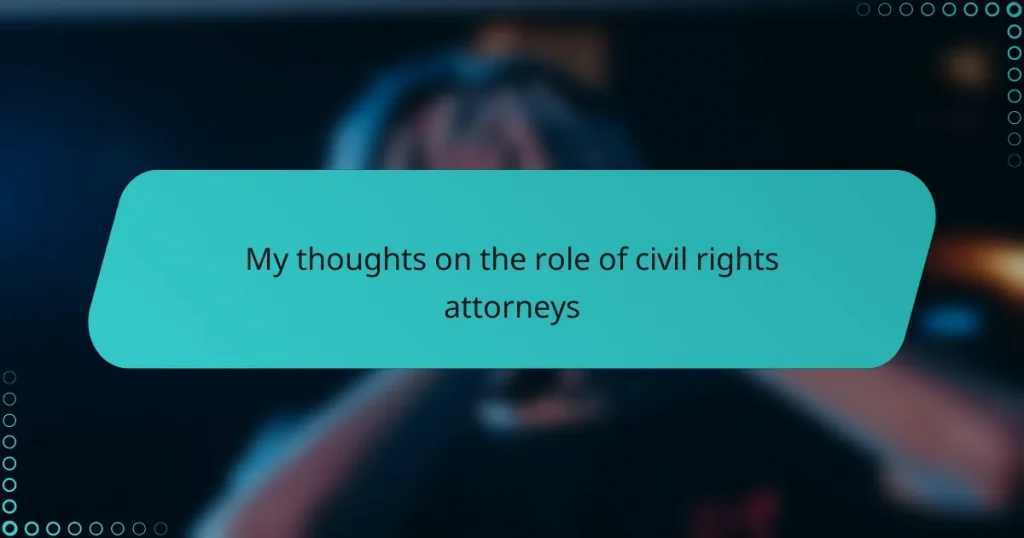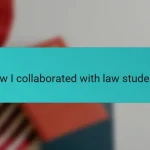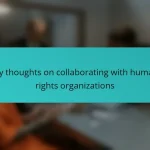Key takeaways
- Legal advocates must combine knowledge of the law with a deep understanding of human stories to effectively represent marginalized voices.
- Civil rights attorneys play a vital role in social progress by not only challenging discrimination in court but also educating communities about their rights.
- Effective strategies include using storytelling to humanize cases, collaborating with community organizations, and being adaptable to changes in the courtroom.
- For aspiring civil rights lawyers, cultivating patience, resilience, and community partnerships is essential for long-term impact and motivation.
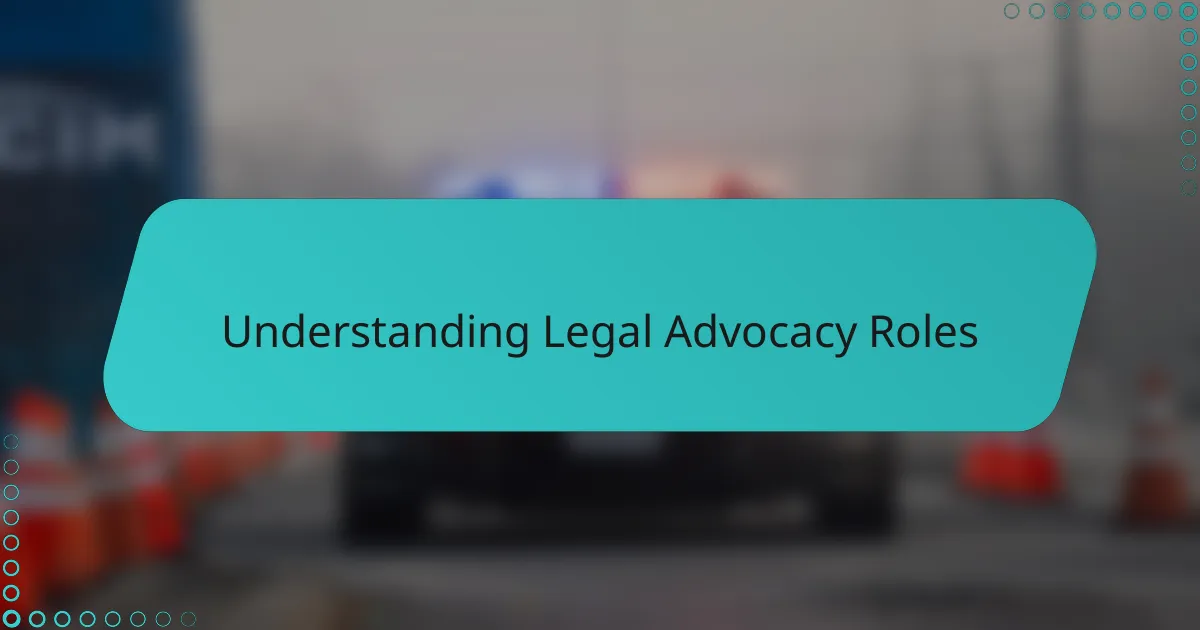
Understanding Legal Advocacy Roles
In my experience, legal advocacy means more than just knowing the law—it’s about passionately standing up for those whose voices are often ignored. Have you ever wondered why some cases spark change while others go unnoticed? To me, it’s the role of the advocate to not only present a case but to humanize the struggle behind it.
When I first stepped into this field, I realized that legal advocates wear many hats. Sometimes, they are fierce negotiators; other times, they become trusted confidants. This fluidity, I believe, is what makes the work so challenging and deeply fulfilling.
Understanding these roles is crucial because it shapes how justice is served. What does it truly mean to advocate? Is it enough to win a suit, or is there more to capturing the essence of fairness? These questions often drive my perspective on what it takes to be effective in legal advocacy.
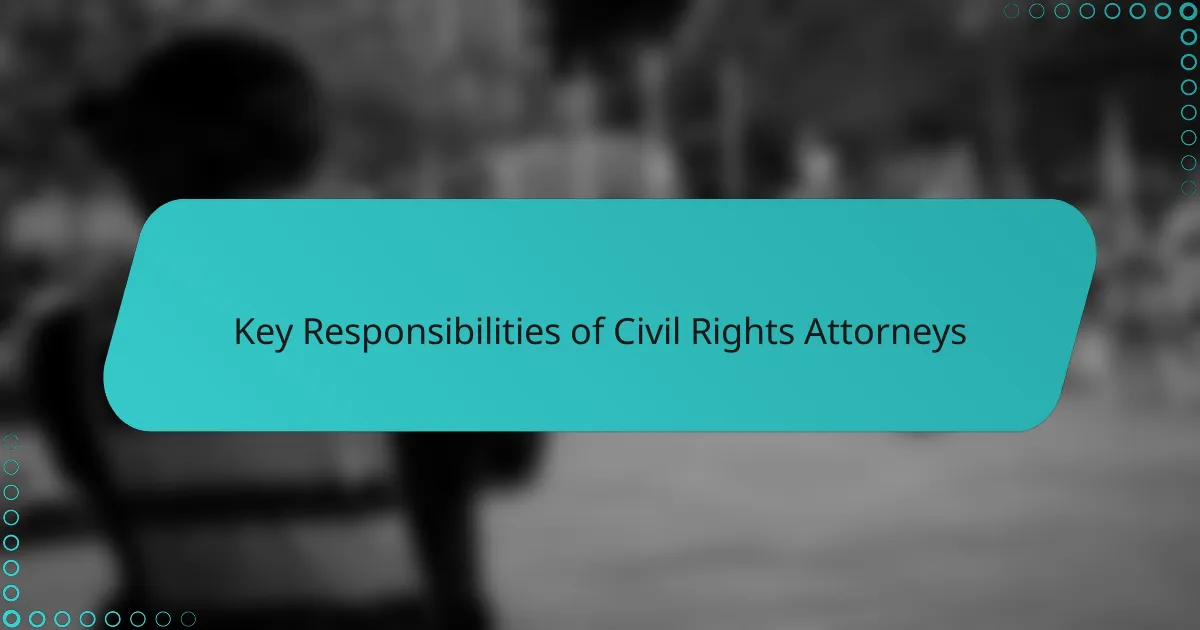
Key Responsibilities of Civil Rights Attorneys
Civil rights attorneys carry the heavy responsibility of not just interpreting laws but fiercely defending the fundamental rights of individuals who face discrimination or injustice. I remember a case early in my career where the stakes felt enormous—not just legally but morally—as I realized how much people’s lives hinged on our ability to challenge unfair treatment effectively.
One key responsibility is investigating and gathering evidence that exposes violations, which often requires sensitivity and persistence. It made me think: how often do we overlook the human stories behind legal documents? For me, connecting with clients on a personal level became essential to build a case that truly represented their experiences.
Beyond the courtroom, civil rights lawyers also play a critical role in educating the community about their rights and advocating for systemic reforms. I’ve seen firsthand how a single successful lawsuit can ripple outward, inspiring broader change and giving others the courage to speak up. Isn’t that the real power of this work?
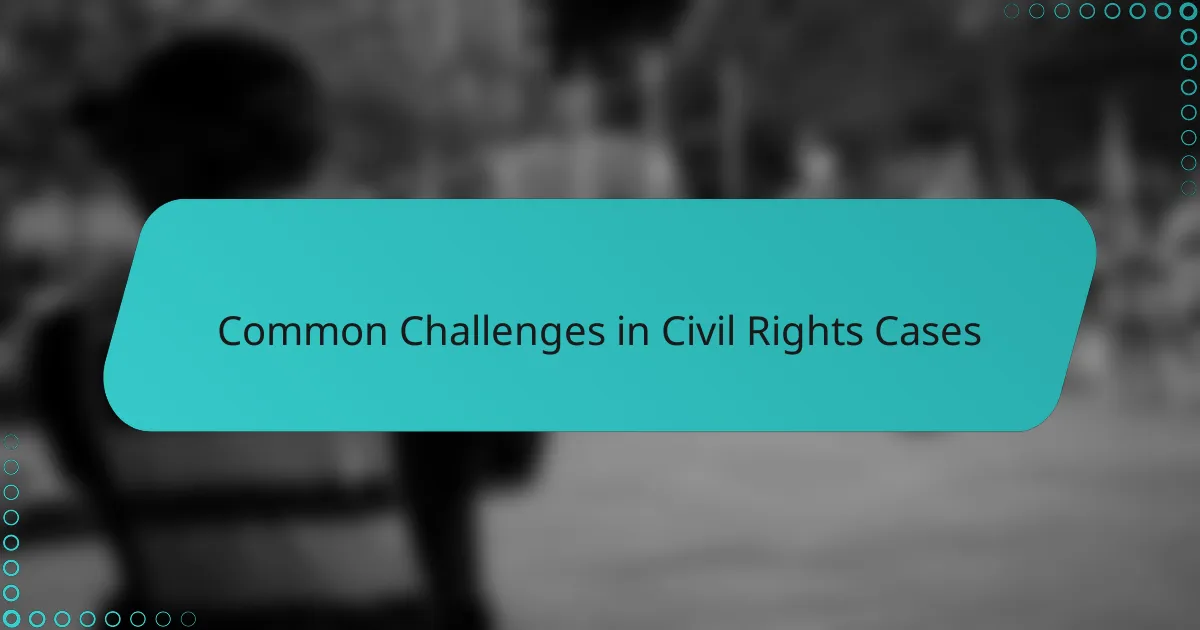
Common Challenges in Civil Rights Cases
One of the toughest hurdles I’ve encountered in civil rights cases is the sheer complexity of proving discrimination. It’s not just about showing something unfair happened but connecting the dots to demonstrate intent or systemic patterns. This often feels like trying to catch shadows, requiring patience and a deep understanding of both people and policies.
I’ve also noticed how heavy the burden of time can be. Cases drag on for months or even years, testing not only legal stamina but the emotional resilience of clients. It made me wonder—how do you keep hope alive when justice moves at such a glacial pace? For me, it’s about celebrating small victories and staying committed to the broader fight.
Another challenge that sticks with me is the skepticism from some judges or juries who may not fully grasp the lived realities behind civil rights violations. Convincing others to see beyond the surface demands storytelling skills as much as legal expertise. Have you ever had to translate complex human experiences into the language of the law? It’s a delicate but vital part of this work.
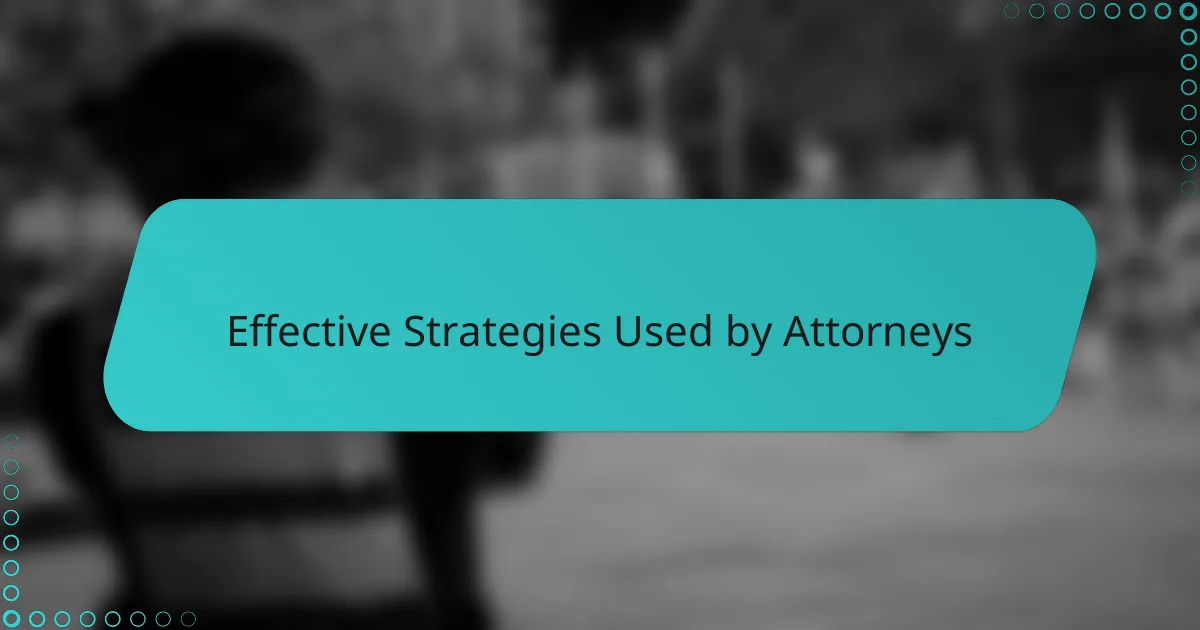
Effective Strategies Used by Attorneys
What I’ve found most effective in civil rights litigation is the strategic use of storytelling. When I weave a client’s personal narrative into the legal framework, it’s like giving a face to abstract rights—making judges and juries see the real impact behind the statutes. Have you noticed how empathy can shift perspectives in ways pure legal jargon never could?
Another approach that has served me well is collaborative advocacy. Partnering with community organizations or expert witnesses often strengthens a case beyond what lone legal arguments can achieve. It’s a reminder that advocacy doesn’t happen in isolation; it’s a team effort rooted in shared commitment to justice.
Finally, staying adaptive—quickly responding to new evidence or shifts in courtroom dynamics—is crucial. Early on, I underestimated how flexible you have to be. Each case taught me that effective attorneys are not rigid but rather nimble thinkers who anticipate obstacles and creatively overcome them. Would you agree that adaptability sometimes makes the difference between winning and losing?
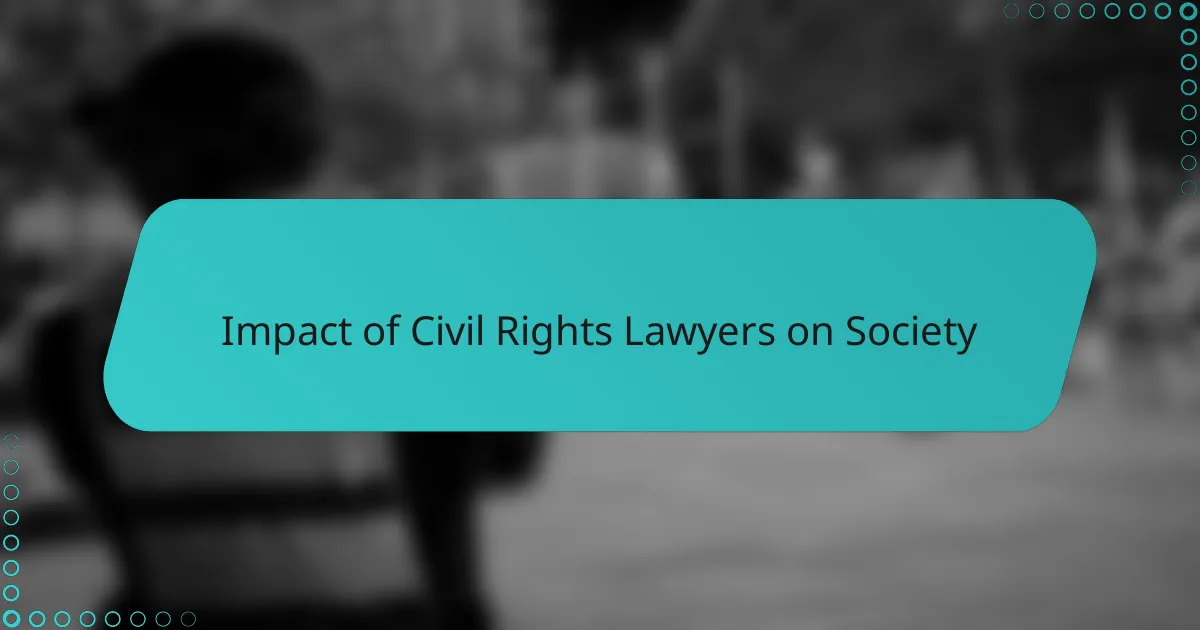
Impact of Civil Rights Lawyers on Society
The impact of civil rights lawyers on society goes far beyond individual cases; they often serve as catalysts for social progress. I’ve seen how landmark decisions not only change laws but also shift public consciousness, making discrimination less acceptable. Isn’t it powerful to think that one legal victory can inspire generations to stand up for their rights?
In my experience, civil rights attorneys help give a voice to marginalized communities that are otherwise overlooked or silenced. When you witness someone regain their dignity through justice, it’s clear how transformative this role can be—not just legally, but deeply human. Have you ever considered how much courage it takes for clients to step into a courtroom and challenge systemic inequality?
Moreover, these lawyers help build momentum for broader reforms, often igniting movements that redefine societal norms. I recall moments when a single case sparked waves of activism and policy change, proving to me that legal advocacy is also a form of public leadership. How many of us realize that behind many social advancements, there’s a civil rights attorney fighting tirelessly to make it happen?
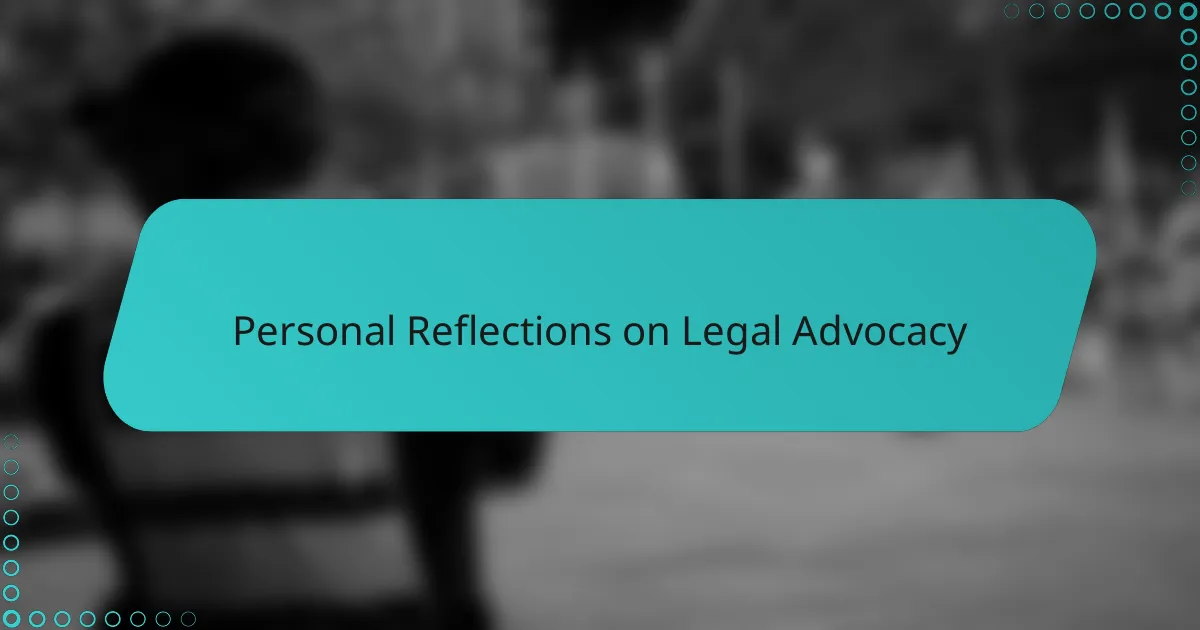
Personal Reflections on Legal Advocacy
Legal advocacy has, for me, always felt like a deeply personal commitment. I recall moments when just listening closely to a client’s story opened my eyes to realities I hadn’t fully grasped before. It’s in those stories that the law transcends rules and becomes a tool for real human change.
Sometimes, I wonder if legal advocacy is as much about patience as it is about passion. The slow, painstaking work behind every case often goes unnoticed, yet it’s where genuine justice begins. Have you ever felt the mix of frustration and hope that comes with this kind of persistent effort?
What always keeps me grounded in this field is the knowledge that each act of advocacy, no matter how small, contributes to a larger movement for fairness. It’s a reminder that beyond the courtroom battles, we’re part of a collective push toward dignity and equality. Doesn’t that make every challenge worth facing?
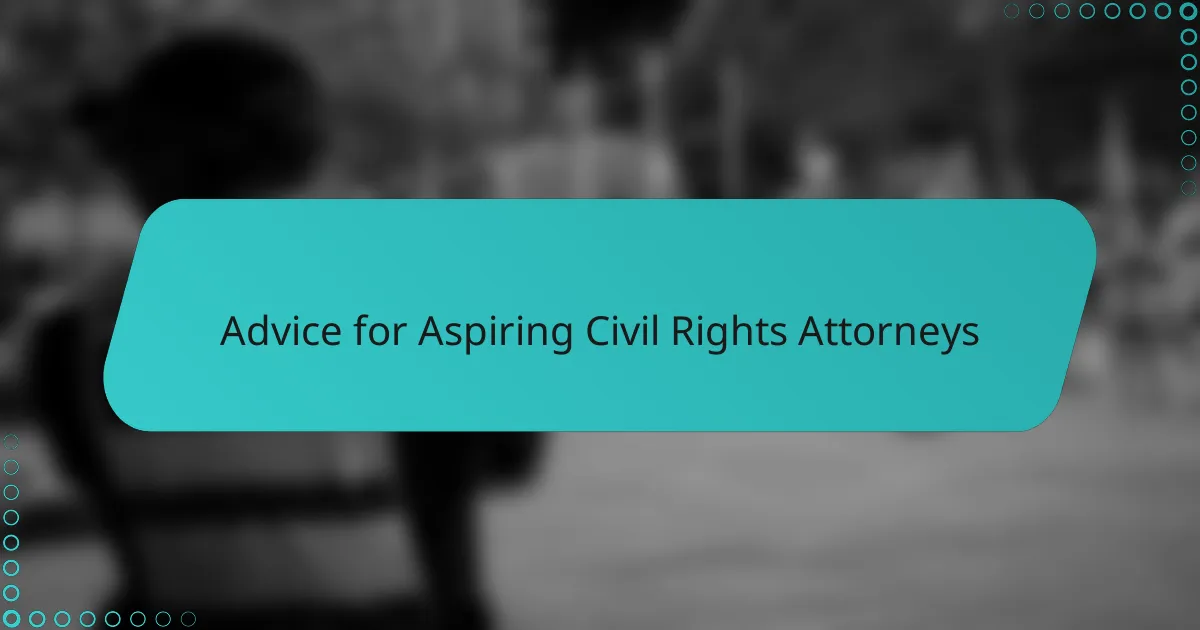
Advice for Aspiring Civil Rights Attorneys
If you’re drawn to civil rights law, my first advice is to cultivate patience and empathy in equal measure. I learned early on that the cases that move me most are those where listening deeply to someone’s lived experience creates a stronger connection—and a stronger case. Have you considered how stepping into someone’s shoes might change not just your approach, but their outcome?
Another lesson I cherish is the importance of resilience. Civil rights work isn’t a sprint; it’s often a marathon against systems built to resist change. I remember feeling worn down after a particularly tough case, and it was the small wins—the moments when a client’s trust was earned—that kept me going. What keeps your motivation alive when the path seems uphill?
Finally, I’d say don’t underestimate the power of community. Partnering with others who share your passion amplifies your impact and sustains your spirit. Early in my career, joining forces with local activists turned isolated struggles into collective movements. Can you imagine how much stronger your advocacy could be with a supportive network behind you?
